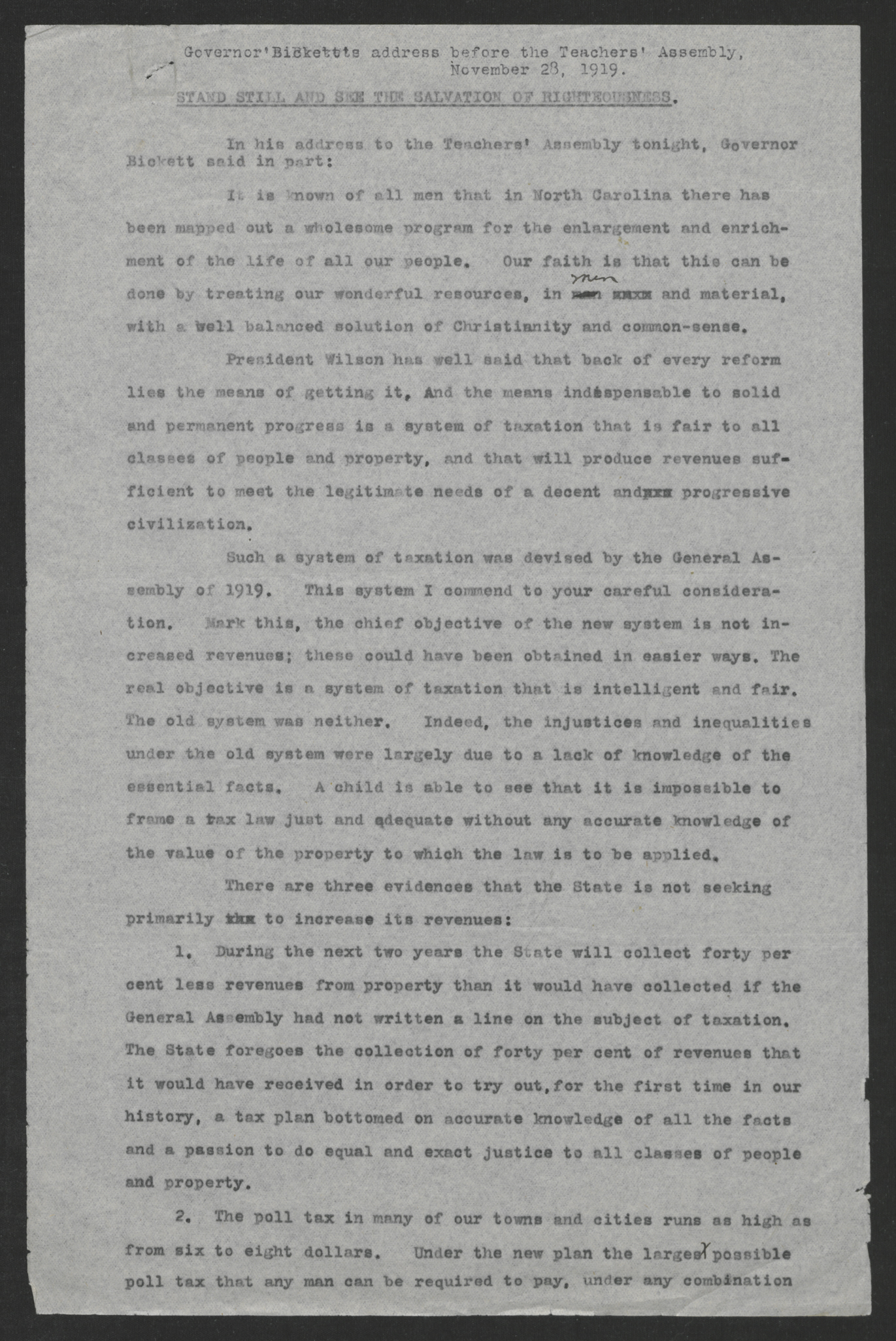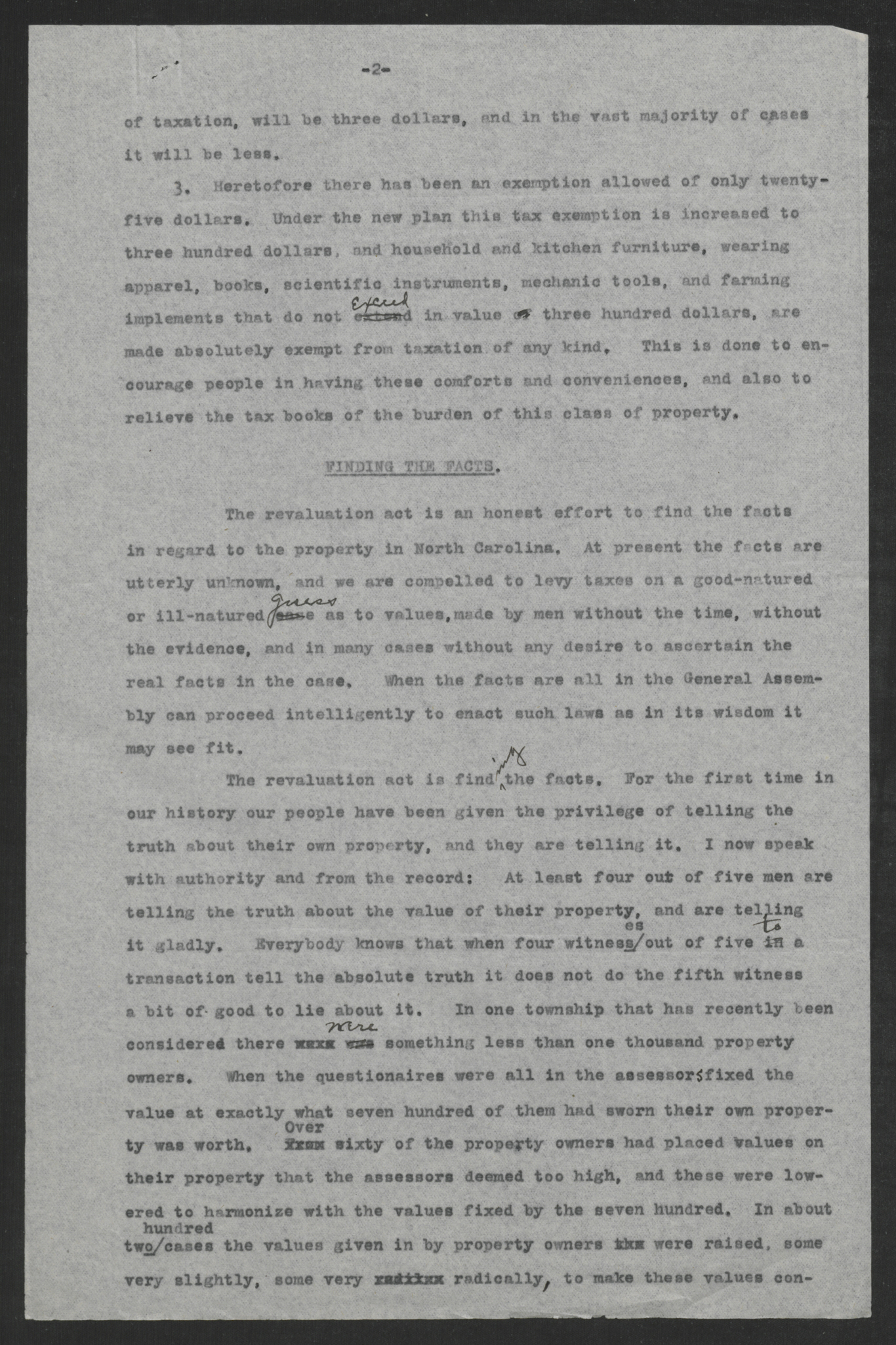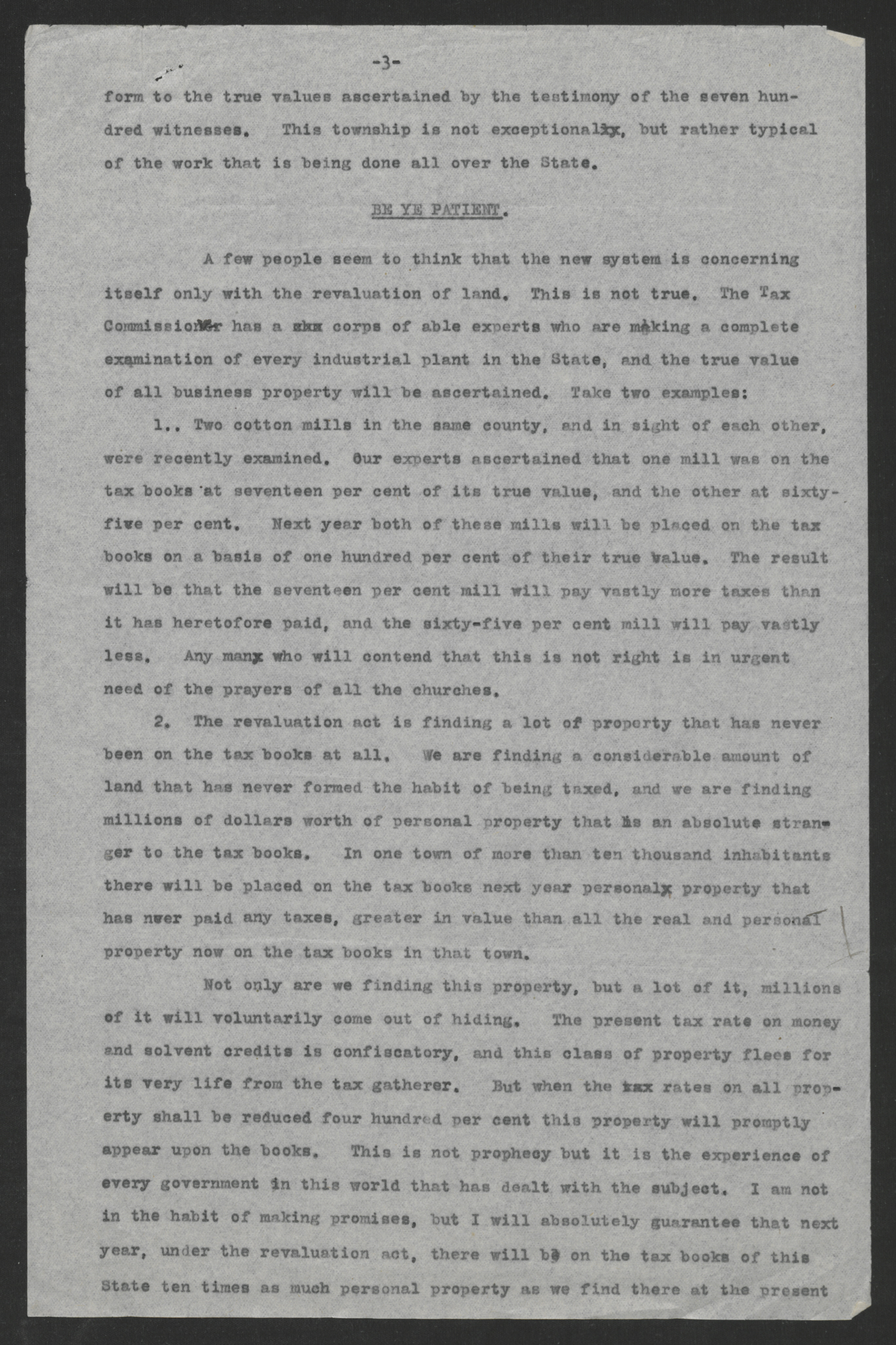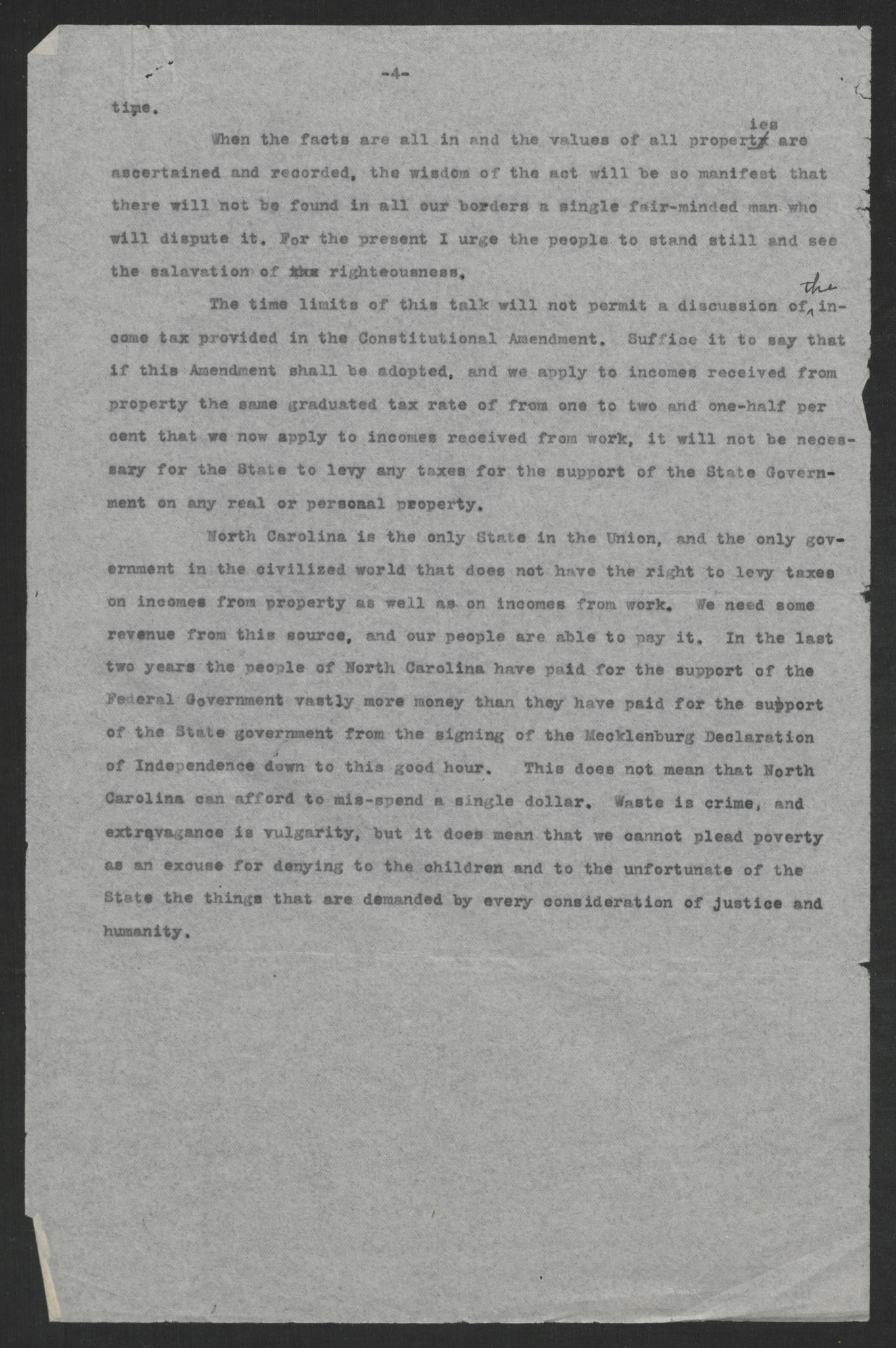Governor' Bickett's address before the Teachers' Assembly, November 28, 1919.
STAND STILL AND SEE THE SALVATION OF RIGHTEOUSNESS.
In his address to the Teachers' Assembly, Governor Bickett said in part :
It is known of all men that in North Carolina there has been mapped out a wholesome program for the enlargement and enrichment of the life of all our people. Our faith is that this can be done by treating our wonderful resources, in men and material, with a well balanced solution of Christianity and common sense.
President Wilson has well said that back of every reform lies the means of getting it. And the means indispensable to solid and permanent progress is a system of taxation that is fair to all classes of people and property, and that will produce revenues sufficient to meet the legitimate needs of a decent and progressive civilization.
Such a system of taxation was devised by the General Assembly of 1919. This system I commend to your careful consideration. Mark this, the chief objective of the new system is not increased revenues; these could have been obtained in easier ways. The real objective is a system of taxation that is intelligent and fair. The old system was neither. Indeed, the injustices and inequalities under the old system were largely due to a lack of knowledge of the essential facts. A child is able to see that it is impossible to frame a tax law just and adequate without any accurate knowledge of the value of the property to which the law is to be applied.
There are three evidences that the State is not seeking primarily to increase its revenues :
1. During the next two years the State will collect forty per cent less revenues from property than it would have collected if the General Assembly had not written a line on the subject of taxation. The State foregoes the collection of forty per cent of revenues that it would have received in order to try out, for the first time in our history, a tax plan bottomed on accurate knowledge of all the facts and a passion to do equal justice to all classes of people and property.
2. The poll tax in many of our towns and cities runs as high as from six to eight dollars. Under the new plan the largest possible poll tax that any one can be required to pay, under any combination of taxation, will be three dollars, and in the vast majority of cases it will be less.
3. Heretofore there has been an exemption allowed of only twenty-five dollars. Under the new plan this tax exemption is increased to three hundred dollars, and household and kitchen furniture, wearing apparel, books, scientific instruments, mechanic tools, and farming implements that do not exceed in value three hundred dollars, are made absolutely exempt from taxation of any kind. This is done to encourage people in having these comforts and conveniences, and also to relieve the tax books of the burden of this class of property.
FINDING THE FACTS.
The revaluation act is an honest effort to find the facts in regard to the property in North Carolina. At present the facts are utterly unknown, and we are compelled to levy taxes on a good-natured or ill-natured guess as to values, made by men without the time, without the evidence, and in many cases without any desire to ascertain the real facts in the case. When the facts are all in the General Assembly can proceed intelligently to enact such laws as in its wisdom it may see fit.
The revaluation act is finding the facts. For the first time in our history our people have been given the privilege of telling the truth about their own property, and they are telling it. I now speak with authority and from the record: At least four out of five men are telling the truth about the value of their property, and are telling it gladly. Everybody knows that when four witnesses out of five to a transaction tell the absolute truth it does not do the fifth witness a bit of good to lie about it. In one township that has recently been considered there were something less than one thousand property owners. When the questionnaires were all in the assessors fixed the value at exactly what seven hundred of them had sworn their own property was worth. Over sixty of the property owners had placed values on their property that the assessors deemed too high, and these were lowered to harmonize with the values fixed by the seven hundred. In about two hundred cases the values given in by property owners were raised, some very slightly, some very radically, to make these values conform to the true values ascertained by the testimony of the seven hundred witnesses. This township is not exceptional, but rather typical of the work that is being done all over the State.
BE YE PATIENT.
A few people seem to think that the new system is concerning itself only with the revaluation of land. This is not true. The Tax Commission has a corps of able experts who are making a complete examination of every industrial plant in the State, and the true value of all business property will be ascertained. Take two examples :
1.. Two cotton mills in the same county, and in sight of each other, were recently examined. Our experts ascertained that one mill was on the tax books at seventeen per cent of its true value, and the other at sixty-five per cent. Next year both of these mills will be placed on the tax books on a basis of one hundred per cent of their true value. The result will be that the seventeen per cent mill will pay vastly more taxes than it has heretofore paid, and the sixty-five per cent mill will pay vastly less. Any man who will contend that this is not right is in urgent need of the prayers of all the churches.
2. The revaluation act is finding a lot of property that has never been on the tax books at all. We are finding a considerable amount of land that has never formed the habit of being taxed, and we are finding millions of dollars worth of personal property that is an absolute stranger to the tax books. In one town of more than ten thousand inhabitants there will be placed on the tax books next year personal property that has never paid any taxes, greater in value than all the real and personal property now on the tax books in that town.
Not only are we finding this property, but a lot of it, millions of it will voluntarily come out of hiding. The present tax rate on money and solvent credits is confiscatory, and this class of property flees for its very life from the tax gatherer. But when the tax rates on all property shall be reduced four hundred per cent this property will promptly appear upon the books. This is not prophecy but it is the experience of every government in this world that has dealt with the subject. I am not in the habit of making promises, but I will absolutely guarantee that next year, under the revaluation act, there will be on the tax books of this State ten times as much personal property as we find there at the present time.
When the facts are all in and the values of all properties are ascertained and recorded, the wisdom of the act will be so manifest that there will not be found in all our borders a single fair-minded man who will dispute it. For the present I urge the people to stand still and see the salavation of righteousness.
The time limits of this talk will not permit a discussion of the income tax provided in the Constitutional Amendment. Suffice it to say that if this Amendment shall be adopted, and we apply to incomes received from property the same graduated tax rate of from one to two and one-half per cent that we now apply to incomes received from work, it will not be necessary for the State to levy any taxes for the support of the State Government on any real or personal property.
North Carolina is the only State in the Union, and the only government in the civilized world that does not have the right to levy taxes on incomes from property as well as on incomes from work. We need some revenues from this source, and our people are able to pay it. In the last two years the people of North Carolina have paid for the support of the Federal Government vastly more money than they have paid for the support of the State government from the signing of the Mecklenburg Declaration of Independence down to this good hour. This does not mean that North Carolina can afford to mis-spend a single dollar. Waste is crime, and extravagance is vulgarity, but it does not mean that we cannot plead poverty as an excuse for denying to the children and to the unfortunate of the State the things that are demanded by every consideration of justice and humanity.
Date:
Sender:
Repository:
Collection:
Places:
»» North Carolina »» Mecklenburg








